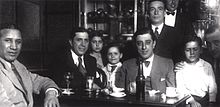| Revision as of 09:03, 14 April 2021 editJJMC89 bot III (talk | contribs)Bots, Administrators3,694,195 editsm Removing Category:Male actors of Italian descent per Misplaced Pages:Categories for discussion/Log/2021 March 22← Previous edit | Revision as of 05:27, 5 July 2022 edit undoAtremari (talk | contribs)Extended confirmed users68,647 editsmNo edit summaryTags: Mobile edit Mobile app edit iOS app editNext edit → | ||
| Line 1: | Line 1: | ||
| {{Short description|Argentine musician}} | |||
| {{Refimprove|date=August 2009}} | {{Refimprove|date=August 2009}} | ||
| ] | ] | ||
Revision as of 05:27, 5 July 2022
Argentine musician| This article needs additional citations for verification. Please help improve this article by adding citations to reliable sources. Unsourced material may be challenged and removed. Find sources: "Pedro Maffia" – news · newspapers · books · scholar · JSTOR (August 2009) (Learn how and when to remove this message) |


Pedro Mario Maffia (August 28, 1899 – October 16, 1967) was an Argentine tango bandoneonist, bandleader, composer and teacher, as well as starring in several tango films.
Maffia had a hard upbringing; he was beaten with a chain by his father and lived in dire poverty. He eventually ran away from home to live in the town of Punta Alta in Buenos Aires Province, where he was discovered by Carlos Gardel and José Razzano.
Maffia is remembered as a pioneer of the bandoneon and a great stylist. He was one of the first to play the instrument a cappella. He had a relaxed playing style and an inventiveness for misplaced accents and nuances.
Maffia starred in a number of tango films including ¡Tango! (1933), Canillita (1936) and Fueye querido (1966). He also worked as a music teacher, and wrote an important method of teaching the bandoneon.
The bandoneonist Aníbal Troilo dedicated a song to him entitled A Pedro Maffia.
External links
- Pedro Maffia at todotango.com
- Pedro Maffia at tango.info